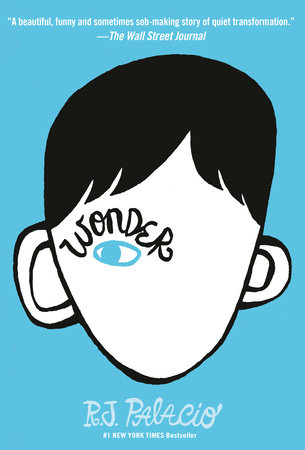Part of me faults the Audible readers. August's voice comes off as a mix between Marge from The Simpsons and Tommy from Rugrats, a sickly sweet near-parody. The other problem with the story, though, is that there isn't an interesting conflict. The book's central conflict seems to be that the characters aren't treated as nice as they should be, when, in fact, the book is populated by very nice people. August was born with a major face deformity (the make-up job in the movie doesn't make it appear as bad as I would imagine from reading the book), so it's understanding that he would be sensitive about people staring at him. In fact, most everyone at that young age has fears that people are staring at them and judging them, but for most of us it's simply a paranoia. People stare, and August senses they feel disgust, but mostly nobody says anything about it.
The major conflict is that August's parents want him to start middle school (he's been homeschooled), and August is worried about entering this new environment. He does reluctantly agree, of course, and he even gains some friends: Jack Will and Summer. His lone enemy is Julian, who really isn't as mean as the book makes him out to be. One issue I have with books like this is that they tend to encourage alienating the Julians of the world, casting them as major villains, when Julian is in reality just a kid and he's not really that mean. The meanest thing he does to August's face is suggest that his favorite Star Wars character is Darth Sidious, who is a badass villain, but whose own facial deformities is meant to serve as a backhanded insult directed at August. It's a bit of a stretch to me. The meanest thing that happens to August, though, doesn't even come from Julian, but from Jack. It's one of the book's more effective moments for reasons I don't want to spoil.
I guess through August's eyes we are meant to consider a human need to be accepted by others, and this is a very real need. But taken to an extreme it becomes narcissistic. One cannot expect to be accepted by all people. Even the best-looking among us has their detractors. But when one has a condition like August's (or any sort of horrible illness), it is the politically correct thing to treat that person as precious, and the book makes August the center of its universe, even as it switches between different character perspectives. Via, August's older sister, feels neglected due to the attention poured onto her younger brother. Multiple other character perspectives revolve mainly around their thoughts about August, and largely from one to another no surprising or interesting insights emerge. Oftentimes plot lines merge and we are told about the same event multiple times, and from character to character there is little difference in the way it is viewed. I question the need to switch perspectives so many times, especially since two of the characters have very brief sections (and one towards the end is essentially there to bring out the tears, though it is a repeat of the events that just unfolded), and one other character makes a first appearance halfway through the book, only to receive a brief, pointless section.
This book is little more than emotional fluff, though the emotional part is enough to make it very popular. There have been plenty of "ugly" characters in literature who are far more interesting than August. Tyrion Lannister comes to mind (again, much uglier in the book than the show). Tyrion is philosophical about his deformities and he fights back with a sharp wit and humor. August simply feeds into feelings of self-pity. On top of that, very little of interest happens. The dialogue is overwritten and dull. Conflicts arise and end quickly, especially one silly, unconvincing "war" that makes up for some of the drama and resolves far more easily than any war should. All of this is the product of a lack of imagination on Palacio's part, not to mention poor writing. The poor writing is especially apparent from the ending action sequence when Palacio literally repeats through character dialogue what she just narrated moments before. To her credit, Palacio knows her audience, knows how to tug their heartstrings enough to get a movie deal, but this book simply lacks enough weight to make it a great reading experience.

No comments:
Post a Comment